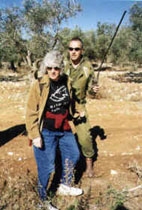At-Home with Gila Svirsky
I first “met” Gila Svirsky in the early 1990s when Naomi Holoch and I were collecting stories for our collection, The Vintage Book of International Lesbian Fiction. Gila has been involved in peace and human rights work for the past twenty years. Born in New Jersey in 1946 and raised Orthodox by Lithuanian Jewish parents who had met each other in Palestine, she later attended Brandeis University and made aliyah following a junior year abroad at Hebrew University in 1966-67. She taught communications at Hebrew University and at Lifta Experimental High School in Jerusalem, married and had two daughters before separating from her husband in 1985 and gradually coming to identify as a lesbian. She has continued to live in Jerusalem, now with her partner of four years, Judy. After working as director in Israel of the New Israel Fund and later as executive director of Bat Shalom, the Israeli side of the Jerusalem Link, she established her own business as an independent journalist and translator.
Gila Svirsky has long been active in B’Tselem, Women in Black, and Bat Shalom. She served as convener of the International Women in Black Conference held in Jerusalem in 1994, and as editor of the International Women in Black Journal from 1991 to 1993. She currently serves as a board member of the Association for Civil Rights in Israel — Israel’s “ACLU”, and also is a board member and former chair of B’Tselem — Israel’s foremost human rights organization in the Occupied Territories. She was a co-founder of Kol Ha-Isha, Jerusalem’s feminist center, and most recently acted as co-founder of the Coalition of Women for a Just Peace — a coalition of eight Israeli and Palestinian women’s peace organizations that advocate for resolution of the conflict in the Middle East.
We have never seen each other’s faces in the flesh, but over the years, Gila became the voice of the lesbian feminist participation in the Israeli peace movement for me. In her e-mails, she chronicled the meetings, demonstrations, the emotional ups and downs of her life in Jerusalem. The rest of the world sees history as a movement of men, with women and children forming the faceless procession of the displaced, the starving, the weeping. And this is true — women and children all over the world suffer in the face of male-controlled militarism and nationalism. But women are also trying to intercede, to muzzle the guns, to find common ground. Women like Lepa and Gila and so many others; lesbian women, hidden among the hidden. What follows are some of Gila’s communiqués to her friends outside of Israel, her attempts to let us know what women and other progressive people are doing to change the tortured geographies of Palestine and Israel.

June 6, 1998
Friends,
Many people don’t know that lesbians constitute a significent proportion of the peace movement in Israel.
Recently I was asked to light a torch at the “Alternate Independence Day” ceremonies in Israel. Since I also spoke about gays in Israel, I thought you may be interested in a translation of my words:
Jerusalem
I, Gila Svirsky, light this torch in honor of all the Israeli women’s peace movements—Women in Black, Bat Shalom, Tandi, Four Mothers, Mothers and Women for Peace, Bridge for Peace, Haifa Women’s Peace Forum, Women’s International League for Peace and Freedom, Shani and others. These are the movements of Israeli women, Jewish and Arab, who struggle not just for the rights of women, but for peace between Israel and its Arab neighbors, particularly the Palestinian nation. These women have always been at the vanguard of peace movements in Israel, both in their radical views and in their creative activities on behalf of peace— dialogue groups between Jews and Arabs, humanitarian aid to refugee camps, “peace circles,” street theater, and above all, the regular weekly vigils that have been going on for 10 years and today exists in various formats in 50 locations throughout Israel. Women’s peace activity is characterized by a feminist vision that sees beyond the end of hostilities; it is a vision of cooperation, equality and creation of a just society that is not driven by generals or militarism. I would also like to dedicate this torch to the homosexuals, lesbians and bisexuals in Israel, a group to which I belong, whose members exist in all strata of society, but which conceals itself in the face of the hatred and prejudices of others. There are many political views among this group, but I am proud to note that the women’s peace movement in Israel has always included a particularly high proportion of lesbians. The time has come to make note of this important contribution.
To the honor of all these, and a state of Israel that will someday belong to all its citizens, I light this torch.